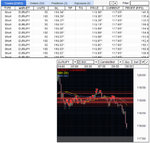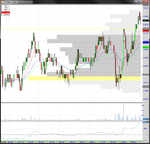My feeling is that despite the general truth of the idea that profits should be greater than losses, and I subscribe to this view, anyone who says at no point during the trade is the profit potential less than the loss potential is often kidding themselves. As in the example I gave, you are up in a particular trade, price is close to your target, risk:reward is horrendous, but many will consider it from the initial trade entry. But the reality is different. The PnL doesn't just exist when it becomes realized as a profit or loss as most like to think. It is a profit or loss in the moment. You are holding a bad risk reward trade. Nothing wrong with that if the probability of it hitting target is high enough. But is it?
Ideally you would at every point in time have the exact probability of it hitting target versus stop and make a decision based on that and whether the expectation is positive. In reality you can never know that probability at all times. i.e. I have trade results which say I win 37% of the time with 1:2 risk reward. But given I've entered and am currently up 5 points, what is the probability for the new risk reward? Next, suppose it's just lost a point, where should my stop and target be etc. Not easy that. It is like requiring an edge at all times, not just on entry.



